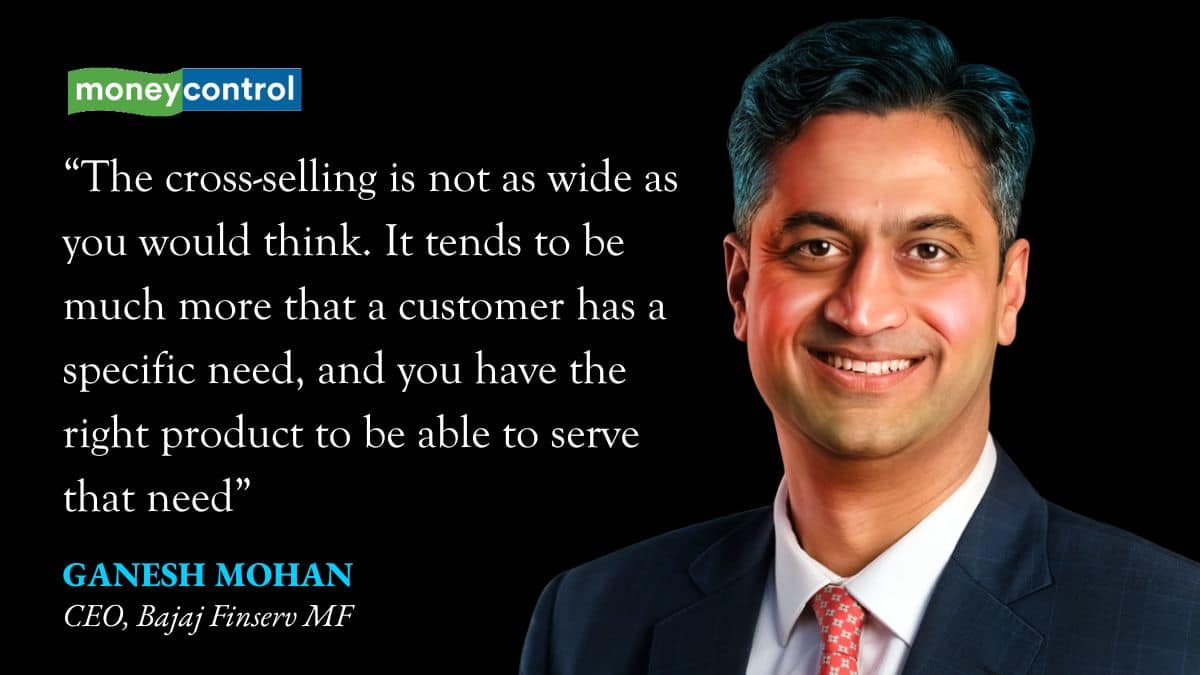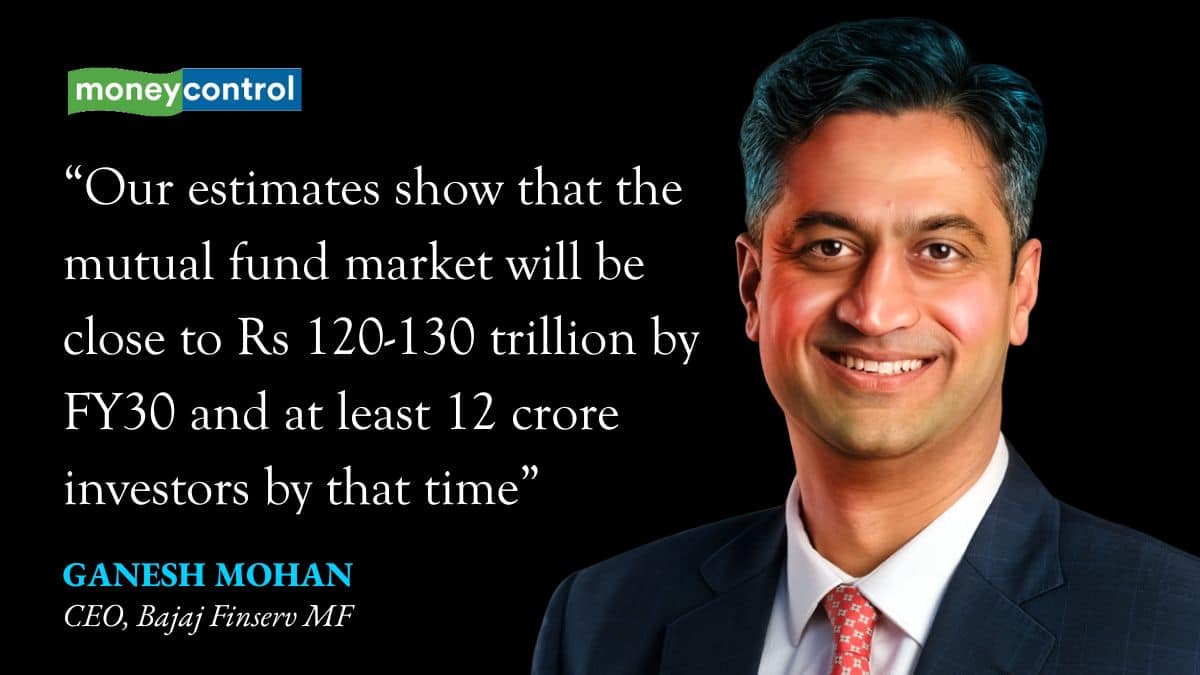
Bajaj Finserv Mutual Fund, which received its final licence on March 1, 2023, has raced past the Rs 10,000 crore level in assets under management (AUM). In the process, it has become the 27th biggest asset management company (AMC) in India's Rs 54 trillion, 44-member mutual fund industry.
The fund house aims to expand its investment team of 15 people to 30-35 by this time next year. It also has plans to launch an alternative business and potentially also an international offshore advisory business.
In an industry dominated by legacy brands such as HDFC, ICICI, SBI and Kotak Mahindra, Bajaj Finserv MF also faces growing competition from new players backed by marquee names such as Samir Arora, Kenneth Andrade and Nithin Kamath.
Also read | 3 ways smart investors make money; one of them will work best today
The fund house is banking on a differentiated investment philosophy, different products and the use of technology to expand its business.
Ganesh Mohan, Chief Executive Officer, Bajaj Finserv Mutual Fund, spoke to Moneycontrol on the experiences of the first year of incorporation, what fueled the AUM growth of the fund house, the impact of Bajaj’s name on the business, and future fund launches.
Edited excerpts:
Take us through the journey so far.
We got the mutual fund licence on March 1 last year. The first fund we launched was a fixed-income scheme in July and an equity fund in August. It's been about six-seven months of business operations as such. It's been a good start to the business and we closed February north of Rs 10,000 crore in AUM. We now have over two lakh investors, with a good split between equity and fixed income.
I think it's a testament to the power of the brand that we stand for. Being the 41st mutual fund player when we launched, it was very important for us to bring in a differentiated approach. We did this in two ways. For the first time in the country, we brought in a focus on behavioral finance in the field of investing. Our investment philosophy utilises the information edge, the quantitative edge, and also the behavioral edge. We call it the InQuBe investment philosophy and Nimesh Chandan, who's our CIO, is quite an expert in that field in India.
Next, we built our fund strategies based on where we believe we can outperform the underlying index over the long term. The flexi-cap fund (Bajaj Finserv Flexi Cap Fund) was based on a mega trends approach, which is future focused, where we pick companies that can grow well in the future. Passive mutual fund schemes (index funds and exchange-traded funds) cannot do that. A passive strategy looks at the past and identifies companies that have done well and then come into the index or companies that are still in the index but underperforming and could be on the way out.
In our large and mid-cap fund (Bajaj Finserv Large and Mid Cap Fund), we have focused on moat investing. This approach focuses on companies that can defend their leadership positions through strong economic moats.
In the balanced advantage fund category (Bajaj Finserv Balanced Advantage Fund), where the decision is of allocation between equity and fixed income, we went beyond just a static fundamental model based on earnings and valuations and introduced a sentiment indicator based on our behavioural finance model, which takes a look at the sentiment in the market at that point.
So, in all the active funds that we’ve launched, we've tried to bring something unique and differentiated.

The strategies employed in your equity funds – flexi-cap fund and large & mid-cap fund – need a longer horizon to bear fruit. But investors, typically, want quick results. Do you think your approach could backfire?
Any fund that we would have launched would have been a challenge for us, because as a group, we do not have an investment track record either through an Alternative Investment Fund (AIF) or a Portfolio Management Service (PMS). But our brand (Bajaj Finserv) is very strong. Yet, you still have to convince investors; there’s no easy way out. Otherwise, why should anybody invest in our new fund offer (NFO)? They could wait for a period of time, see performance and then come in later.
Also read | MF stress test: Check whether your smallcap fund has these illiquid stocks
The logic was very clear to us. People would invest in an NFO only if it is a very differentiated product that brings something that is not in the market, and that has been brought in by people who have managed similar funds before. If both of these points are valid, then you can still have a reasonable case to invest.
We are not launching funds just for the sake of launching. We want to bring something differentiated.
How helpful was the Bajaj name?
Incredibly helpful. The Bajaj group is a very well-known brand in the country. Bajaj Finserv, a slightly more recent name, is now a big brand in the financial services domain. For any investor and distribution partner, it's an easier name to work with, and customers are comfortable writing a cheque to Bajaj Finserv. Most distribution partners have probably worked with one of our group companies, whether it is Bajaj Finance on the (fixed) deposits side or Bajaj Allianz on the life insurance or general insurance side.
What are your views on cross-selling to the customers of your parent company? A customer taking a loan might not be interested in investing at the same time. So, how are you treading that path?
A customer who’s coming for a loan is typically not looking to invest, and an investing customer is actually quite a different customer. So, a fixed deposit (FD) customer is not necessarily looking for a loan either. The cross-selling is not as wide as you would think. It tends to be much more that a customer has a specific need, and you have the right product to be able to serve that need.
From our perspective, we realise that. We see that a customer who’s coming to, let’s say, purchase a TV, is not necessarily looking to invest in a mutual fund at that point or even to buy health insurance. So, it's not necessary that those will intersect. For us, it’s important that we work with multiple distribution partners. So, we work with about 35,000 mutual fund distributors, national distributors, banks, digital partners, as well as our group companies and our own digital channels.
Would you look to put limits on the amount of business that you get from your parent company as a distribution partner?
There’s no threshold at this point because right now we are a very nascent business. We welcome business coming from anywhere. So for us, whether the business comes direct, regular or from one channel partner or the other, we are neutral. For us, we would love to see all the channels do very well.
You have crossed Rs 10,000 crore in AUM. Have you set any targets?
Not really. We’re looking to grow our business in a very different way. We are seeing traction and our brand is strong. We believe that if we bring the right kind of products, differentiated products, make it easy for people to interact with us and use technology to help build scale, there is really no limit to growth.
The mutual fund market today is about four crore unique investors and the industry AUM is about Rs 54 trillion. Our own estimates show that the market will be close to Rs 120-130 trillion by FY30 and at least 12 crore investors by that time. So, when the market is growing three times, that’s the incremental pool of money that we can look to tap into. We don’t set a target to say this is where we will be happy. It’s really about how you are going to create a differentiated position in such a large and growing market.

Many mutual fund distributors recommend schemes to their clients only when a fund house has a certain track record. How are you engaging with them?
We tell them how our product is different. We take them through our portfolios. When we say Bajaj Finserv Flexi Cap Fund is based on a ‘megatrends’ strategy, the question is: how is that being reflected in our portfolio.
Also read | March mayhem in equity markets: Where to invest your money today
For the first time in the industry, we launched a fact sheet, which basically shows which megatrend every single company in our portfolio is benefiting from. So, that gives much more comfort to our distribution partners & investors.
Being a Pune-based fund house, do you struggle to attract talent?
Let’s get one thing straight: a mutual fund is a people-centric business.
When we interview fund managers—and we interview quite a lot of them—probably 15-20 percent are ‘wedded’ to Mumbai. But given that we are part of the Bajaj group, people are very willing to explore and engage in a conversation.
Here, what we found is something very interesting. Once people make the shift, they see the advantages of a city like Pune. It's a city that's a little bit away from the action, but it's a city that gives you far more benefits in terms of commute, quality of life and homes as well.
Mumbai is like a cauldron. During market hours, everybody's in the mix. Even afterwards, if you go out and meet peers and friends, you may still end up discussing the markets and something that’s very much related to the industry.
Now, when you sit in a city like Pune, a bit away from the noise, you'll still get all the information. But you're not overwhelmed by all the noise, so you can still march to your own beat. And for an investment team, that is actually crucial.
Give us a blueprint on your future fund launches.
We're considering a set of launches over the coming year. Between a multi-asset fund or a focused fund is something we'll be considering. We were considering a small-cap fund as well, but given the current market environment, I think we'll probably wait and watch on that for a bit. We will also potentially look at some thematic funds as well. On the passive side, while we've already launched a couple, we'll be expanding that product suite as well.
Discover the latest business news, Sensex, and Nifty updates. Obtain Personal Finance insights, tax queries, and expert opinions on Moneycontrol or download the Moneycontrol App to stay updated!

Moneycontrol Pro Panorama | Mergers are not a please-all solution
Mar 19, 2024 / 02:59 PM IST
In this edition of Moneycontrol Pro Panorama: IT stocks still a favourite despite earnings cut, learn to predict market price reve...
Read Now
Moneycontrol Pro Weekender: Saint Powell and the inflation dragon
Mar 9, 2024 / 10:03 AM IST
While the markets reach all time highs, the Bank for International Settlements warns that the last mile on disinflation is a diffi...
Read Now